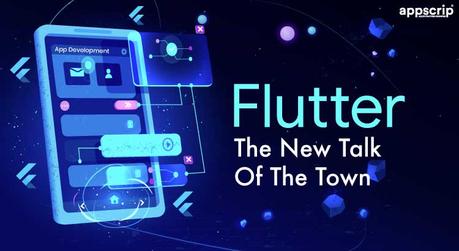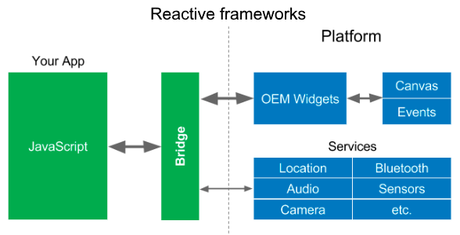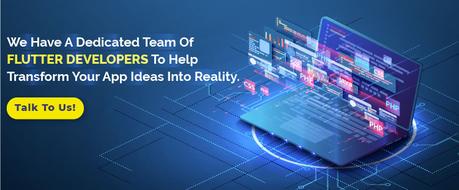
With mobile applications continuing to become more and more popular with each passing day, many programming tools are readily available to developers who want to create them. Among these tools, lately, Flutter has distinguished itself!
What is Flutter?
Flutter is an open-source UI software development kit created by Google. It is used to develop applications for Android. iOS, Mac, Linus, Google Fuchsia, Windows, and the web from a single codebase. It is not just a framework, but a complete software development kit (SDK), which contains everything one needs to build cross-platform applications. This includes a rendering engine, ready-made widgets, testing and integration APIs, and command-line tools.
Framework Architecture Of Flutter
There are four major components of Flutter:
Dart Platform
is Flutter's object-oriented language that uses Ahead-of-Time compilation techniques and compiles into native code without that additional bridge. This helps speed up the app startup time.
Moreover, Flutter doesn't have to call OEM (original equipment manufacturer) widgets, because it uses its own. It uses the OS as a canvas to build an interface on and moves services such as gestures, rendering, and animations into the framework itself, which gives developers complete control over the system.

Flutter's engine, which is primarily written in C++, provides low-level rendering support using Google's graphics library. It also interfaces with platform-specific SDKs such as those provided by Android and iOS.
The Flutter Engine is a portable runtime for hosting Flutter applications. It implements Flutter's core libraries, including animation and graphics, file and network I/O, accessibility support, plugin architecture, etc. Most developers interact with Flutter via its framework because this renders a reactive framework and a set of platform, layout, and foundation widgets.
Foundation Library
The Foundation library, which is written in Dart, provides basic classes and functions. These can be used to construct applications using Flutter to communicate with the engine.
Design-specific Widgets
The Flutter framework contains two sets of widgets. They conform to specific two design languages:
- Material Design widgets, which implement Google's design language of the same name
- Cupertino widgets, which implement Apple's iOS human interface guidelines.
Why Should You Learn Flutter in 2021?
Simple To Learn & Use
Flutter is a modern framework and is way simpler to create mobile applications with it. If one already has knowledge about Java, Swift, or React Native, they will certainly notice how different Flutter is!
Maximum Productivity
When you change your code, you can see the results in real-time. How cool is that! This process is called hot-reload, which takes close to no time after you save to update the application.
Ideal For Startup MVPs
If you want to show your product to investors as soon as possible, Flutter is a good choice.
Reasons why startups should use it for their MVP?
- It's much cheaper to develop a mobile application with Flutter
- You don't need to create and maintain two mobile apps (iOS & Android)
- Only one developer is needed to create your MVP
- It's performant. One will not notice the difference between a native application and a Flutter app
- One can easily use widgets, and personalize them to create a valuable UI
Find examples of applications made with Flutter here.
Great Documentation
It is very important for any new technology to have good documentation. Flutter's documentation is very detailed with super easy examples for basic use cases.
Supported By Both Android Studio & VS Code
Flutter is available on different IDEs.
- Android Studio is a complete software, that has everything integrated already. You just have to download Flutter and Dart plugins to start.
- VS Code is a lightweight tool. Everything is configurable through plugins from the marketplace.
Will Flutter Replace Java?
There are quite a few key qualities that make it suitable for replacing Java:
- Hot reload- Like I mentioned earlier, one of the drawbacks of Java is the loss of time for building a project. The Flutter Hot Reload feature allows you to display the effect of your edits in the code almost immediately.
- Compatibility- Since widgets are part of the app and not the platform, you are likely to experience less or no compatibility issues on different OS versions.
- Graphic Library- Flutter uses the Skia built-in library for rendering. This makes it even more platform-independent. The SDK provides a rich set of widgets in particular,-the Material and Cupertino collections for rendering native-like widgets for Android.
- Fuchsia OS- Flutter is currently the only tool for creating applications for the Fuchsia OS from Google. Particularly ardent fans call it the "Android killer," which should blur the line between mobile, desktop, and web development.
Flutter has grown by +303% on this platform between 2019 and 2020.
Let Me Also Play The Devil's Advocate
Flutter needs more evolution to compete with Java for android application development. There are quite a few limitations as well:
- You can't use Flutter to build apps for tvOS, watchOS, CarPlay, or Android Auto. There's some limited support for Wear OS (formerly Android Wear).
- It is still an evolving framework with limited community support.
- Flutter apps try a lot to look similar to native ones but they are a bit off.
- It only supports Dart for the GUI part. The GUI is developed on top of the stripped-down chrome. There is no JS and no DOM as Dart is used like JS in the browser.
- Although it gives an amazing UI package, yet the requirement of third-party libraries for extensive development is still awaited.
Nonetheless, Flutter can make it more comfortable for startups to roll out with the feature-rich mobile application without putting a burning hole in the pocket.
If you are planning to launch a mobile app, you shouldn't be in a dilemma anymore about which cross-platform framework you should choose in 2021.


